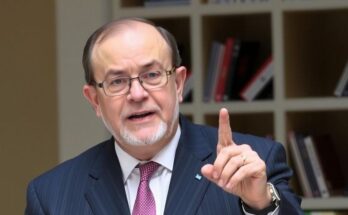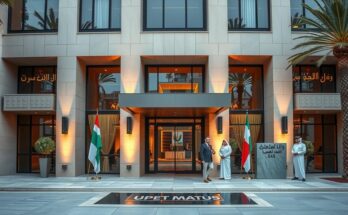Syria and Lebanon committed to strengthening ties following years of conflict during a historic visit by Lebanese Prime Minister Najib Mikati to Damascus. This engagement follows significant political changes in both countries, focusing on shared interests such as refugee repatriation and border security. Leaders expressed their intent to address longstanding issues collaboratively, indicating a potential shift towards greater stability in the region.
On Saturday, Syrian Prime Minister Najib Mikati made a historic visit to Damascus, marking the first trip by a Lebanese head of government since the onset of the Syrian civil war in 2011. During this visit, he and Syria’s new leader, Ahmed al-Sharaa, expressed intentions to strengthen bilateral relations following years of tension exacerbated by the complex geopolitical landscape. Al-Sharaa emphasized the necessity for a fresh start, stating, “There will be long-term strategic relations between us and Lebanon. We and Lebanon have great shared interests.” This visit comes in the wake of significant changes in Lebanese leadership and regional dynamics following the recent fall of Bashar al-Assad’s regime in Damascus.
The conversation revolved around mutual interests, including the urgent issue of approximately two million Syrian refugees residing in Lebanon since the onset of the conflict, which has placed an immense burden on the Lebanese economy, further deteriorated by a severe economic crisis since 2019. Mikati referred to the repatriation of these refugees as an “urgent matter in the interest of both countries”, highlighting joint efforts to manage this crisis effectively.
Additionally, the deliberations included finding resolutions to border disputes, with Mikati advocating for a joint committee to address delineation of land and maritime borders. The Lebanese Prime Minister voiced the necessity for “complete control of (land) borders, especially over illicit border points” to mitigate smuggling, reinforcing the importance of strengthening border security in light of existing tensions and illegal activities which have characterized the region. The borders between Syria and Lebanon lack official demarcation at numerous points, contributing to smuggling vulnerabilities.
This new diplomatic approach has drawn attention from international entities, as foreign dignitaries, including representatives from Italy and France, have visited Damascus in recent weeks, marking a shift in regional diplomatic relations. Following a turbulent decade marked by conflict and massacre that saw more than half a million casualties and extensive economic devastation, this renewed dialogue suggests a potential for fostering stability and collaborative efforts between the two nations moving forward.
The relationship between Syria and Lebanon has long been complex, characterized by periods of intervention and conflict stemming from Syria’s dominance in Lebanon during the civil war years of 1975 to 1990. The Syrian army maintained a significant presence in Lebanon until 2005, when troop withdrawal occurred following widespread protests. In recent years, political dynamics have shifted with the rise of Hezbollah in Lebanon, which supported Assad’s regime during the Syrian conflict, sparking tensions with former Lebanese governments reluctant to engage with Damascus. The recent change in leadership both in Syria and Lebanon signifies a crucial moment for reevaluating relations, especially in light of pressing issues such as refugee crises and border delineation.
In summary, the visit of Prime Minister Najib Mikati to Damascus symbolizes a pivotal moment in Lebanese-Syrian relations, highlighting an earnest endeavor to mend ties after a tumultuous decade. With mutual challenges such as the refugee crisis and border security requiring collaboration, both leaders expressed a commitment to fostering a cooperative future. The international attention this development is garnering suggests that it may pave the way for broader regional diplomacy.
Original Source: www.rfi.fr




